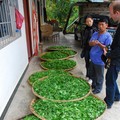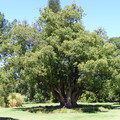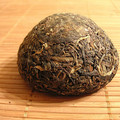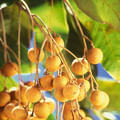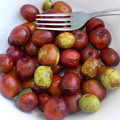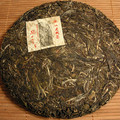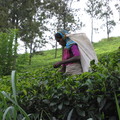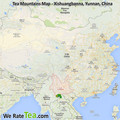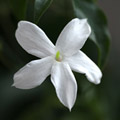We compared two teas from Youle. 2005 Jinuo Shan You Le "Red Sun Drum" and 2009 Youleshan Tuo Cha Raw 100g. There is a difference of 4 years between those two teas. They also differ in shape and processing method.
Older "Red Sun Drum" is already a 9-year-old, big cake, weighing 357g. It is loosely pressed and contains a wide leaves. Tea matured first 5 years in humid environments Banna. Unfortunately, it is already sold out. The final price was $35 on Yunnan Sourcing.
Younger 100g tuocha is now 5-year-old and is very firmly pressed. You should be very careful while chipping to avoid injury;) There is the note about "wild arbor" material in the tea’s description. I am little bit skeptical regarding this. The leaves are partially chopped. You can still find big long buds and entire leaves in the tea. Tuocha was also stored in a humid environment of Banna for 4 years. Tea now costs $5 per tuochu.
Both teas have a very sweet, floral - fruity aroma typical for Youle area. The taste of cake from year 2005 is fruitier and sweeter than 2009 tuo. Cake is well settled and matured now. There is virtually no astringency, infusion of orange color. Leaves are in very good quality. Tuocha matures more slowly because of its heavy compression. It can be seen even on leaves that are still freshly green after 5 years. Tuo contains very strong astringency, which is a promising sign for the further maturation. There is also enough energy with wilder characteristic.
Now price. Tuo is about half the price of cake. If you like tea from Youle, in my view, it is "bargin" :) I bought tong and I shall see how the tea develops.
Was this review helfule? Yes 0 / No 0 Tag as improper
 1 review
Added 04.06.2014 by Eternal Spring,
Tea status: [373] A
13768x
1 review
Added 04.06.2014 by Eternal Spring,
Tea status: [373] A
13768x

 Shops
Shops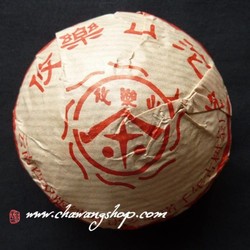







 Share on Facebook
Share on Facebook











